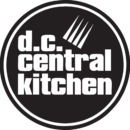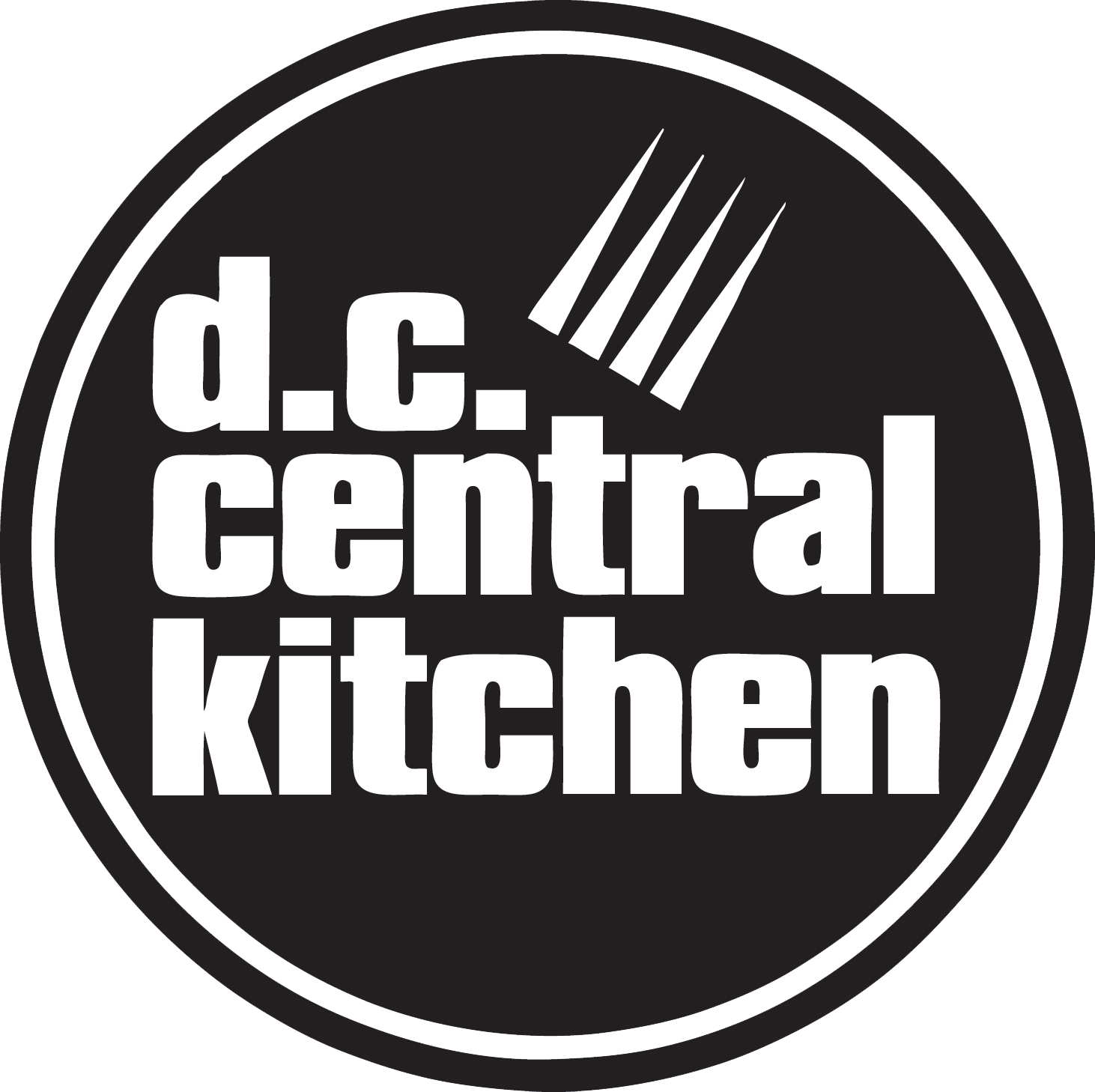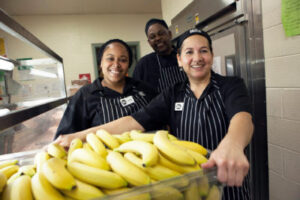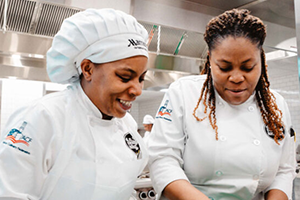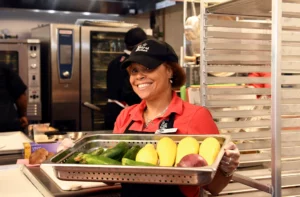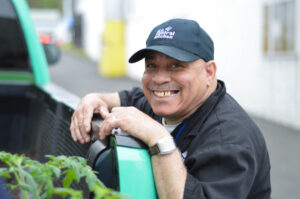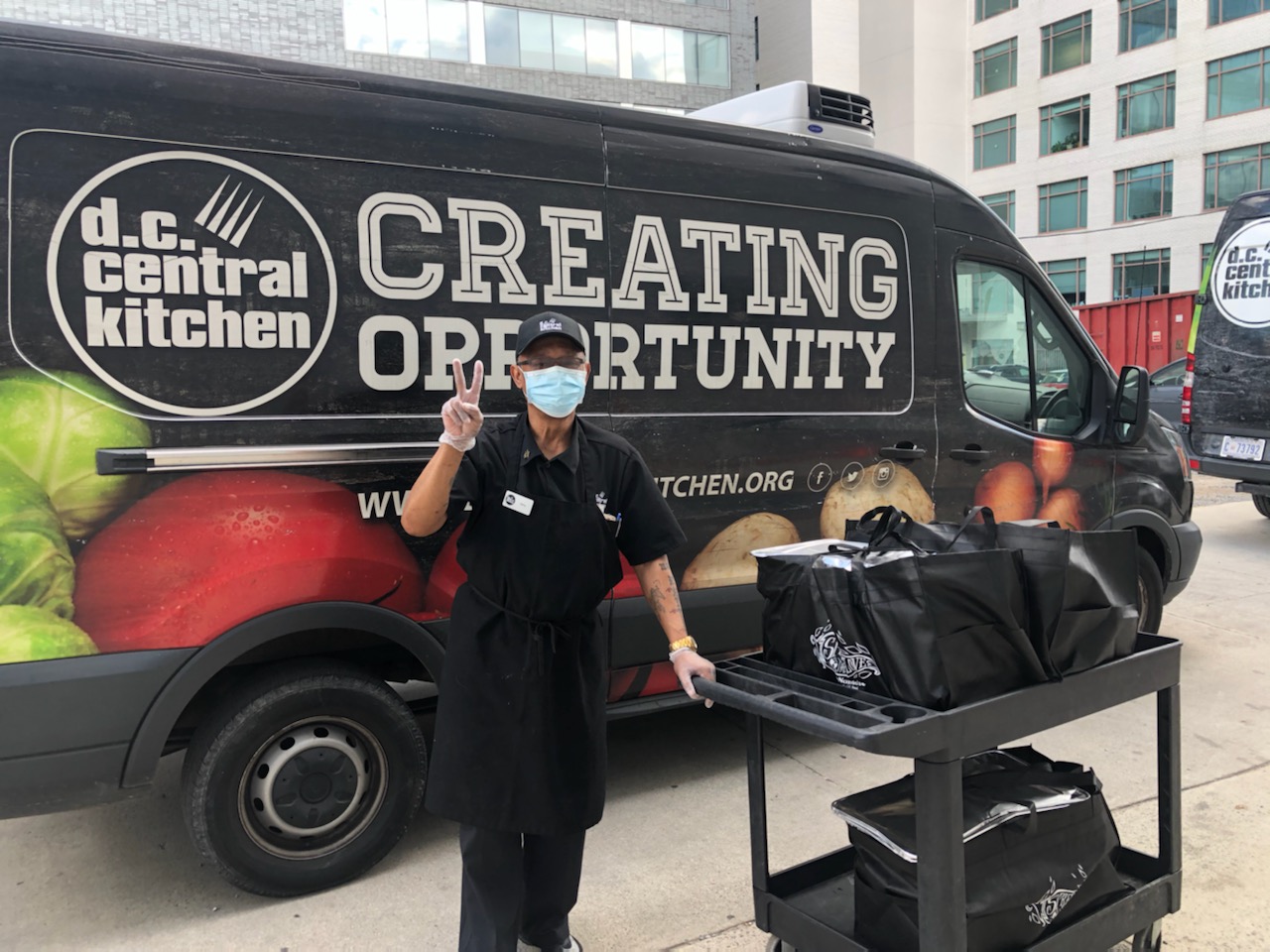In the three years since COVID-19 struck our city, DC Central Kitchen has adapted to one profound change after another. We’ve worked to be as transparent as possible about what we’ve seen, learned, and modified, using our platform to share the perspectives of people and communities hit hardest by the pandemic and honoring the trust that so many in our community have shown us as we’ve forged ahead with new projects and initiatives. For all we poured into a dedicated COVID response website, detailed annual reports, dozens of media interviews, and more emails, newsletters, and grant reports than we could count, the intensity of the past three years and complexity of our daily work meant that there are still some stories left untold.
This month, at the direction of the Federal government, the additional emergency allotments provided to food insecure Americans via the SNAP program came to an end in DC and the remaining states who hadn’t already declared the pandemic a thing of the past. After serving more than 8.5 million meals through an operation that didn’t miss a single day – not when schools closed, or when Metro scaled back service, or when a violent insurrection forced a security perimeter to encircle our building and make deliveries of food all but impossible – no one should be more ready to turn the page to a new chapter than DC Central Kitchen. But the fight against hunger, unemployment, and poverty in our city is far from over, and it remains harder and even more urgent today than it was before COVID. No, we can’t afford to treat March 2023 like it’s March 2020, but we also can’t afford to forget the lessons of this time if we’re going to have any success in combating the continued effects of this crisis – or the underlying disparities that made it such a destructive force.
Just weeks into the crisis, a local priest called to let us know that the Little Sisters of the Poor were on the verge of closing operations. Without masks and meal containers – which had become impossible for them to find – these devoted volunteers would need to shut down. We tapped our supply chain and delivery fleet to provide everything they needed to continue on safely. It was a simple step, but it showed us how central we might be in the wider ecosystem of local nonprofits in the months ahead if we were willing to look beyond our own (ample) challenges and demands to the needs of our partners.
Soon after, our growing connections to agencies and mutual aid organizations serving Latino families whose jobs and stability were upended by the pandemic led one volunteer group to ask us for help with a very specific need: infant formula. This already costly item, which we had never provided before, would soon be subject to rising inflation and then a very public supply shortage. Throughout those disruptions, our team has faithfully provided monthly quantities of this essential item, scouring for supplies online and paying $30,000 out of pocket for formula that volunteers picked up and delivered to low-income families and their babies.
We also quickly came to rely on the pick-ups and deliveries of another critical partner, FoodRescue.US. We’ve been in the food recovery game for 34 years, and after all that time we know which products and volumes make sense for our operation. That means we can’t recover every potential donation of nutritious food in our city – but the inspiring staff and volunteers at FoodRescue.US seemingly can. On a weekly basis, we shared food recovery opportunities with one another, combining to prevent the waste of 61,000 pounds of food at a time when every surplus serving mattered.
In the summer of 2020, we forged a critical partnership with AfriThrive, an organization serving African immigrants in our region who faced especially high barriers to accessing emergency services and culturally appropriate foods. They soon became one of our primary allies in distributing many of the thousands of bags of local produce we were assembling each week in mostly vacant catering and event facilities. At the end of 2021, when those borrowed facilities returned to hosting events, we knew we didn’t have the space to continue assembling that staggering volume of groceries. Instead of discontinuing service, we made the choice to underwrite deliveries from other produce vendors directly to AfriThrive and other critical partners who otherwise would have needed to end or dramatically reduce their own food distribution programs. Since then, we have invested $170,000 in these ongoing deliveries of fresh fruits and vegetables while providing technical assistance with grant applications to support our partners’ lasting sustainability.
When school resumed in the fall 2020, the public school parents behind the all-volunteer DC Food Project were planning an ambitious expansion of their already inspiring response to student food insecurity. What started as an effort to supply their regular distributions of healthy food to at-risk students and families soon evolved into an innovative school pantry program, where students identified by trusted school personnel could discretely access healthy, kid-friendly snacks and staples before, during, and after school hours. They didn’t start small and wait for a lengthy pilot program to play out; with our support in purchasing pantry cabinets and providing food supplies, they scaled aggressively and now operate these critical pantries at 28 schools citywide, with plans to grow even more this year.
While DC has long been home to one of the nation’s highest rates of childhood food insecurity, the District is America’s unquestioned leader in hunger among seniors. Last spring, we began working with several local agencies and housing communities focused on low-income seniors to provide targeted deliveries of meals, fresh-cut produce, and groceries to resident managers and even directly to seniors’ doors. Today, because of this focused outreach, we are serving more than 7,600 additional meals each month to food insecure seniors, many of whom fall in the substantial cracks left by the eligibility criteria of other programs. Undertaking these types of additional efforts in the face of a 20% spike in food costs and 70% increase in kitchen supply expenses wasn’t easy, but reflected our commitment doing more when we were needed most rather than scaling back simply because COVID-inspired funding and media attention began to wane.
For all the bold bootstrapping we’ve done to get nutritious food where it was most needed during this time, we’ve never lost sight of our core focus on jobs and ripping out the root driver of food insecurity: poverty. When we lost the ability to safely host our valued volunteers in our crowded kitchen, we created more than 20 new full-time jobs for alumni of our Culinary Job Training program to keep pace with community needs. In the spring of 2022, when downtown DC was struggling, we forged ahead with opening our second social enterprise cafe as an innovative job training and job creating venture in the Martin Luther King, Jr. Memorial Library. In the coming days, we’ll open our third cafe in Southwest DC; how many other local foodservice businesses are operating three locations across the District, let alone opening them in this business environment with robust commitments to employee benefits and living wages?
Instead of using the pandemic as an excuse to do less for our employees, we’ve chosen to do even more. We partnered with Honeybee, a socially-minded B-Corp, to provide critical financial assistance to our staff. With 102 graduates of our culinary program now employed at DCCK, we are committed to helping them achieve lasting financial stability as they overcome the structural and personal challenges that initially brought them to our program. Through Honeybee, we’ve provided individual financial counseling and $61,000 worth of no-risk, credit-building pay advances and emergency loans to employees who may need help paying down high-interest debt or overcoming a sudden financial need such as a car repair, family illness, or loved one’s funeral. These resources are a positive alternative to payday loans and other risky practices and build on our existing benefits to staff, which include paying 100% of all health insurance costs and fully matching 401(k) retirement savings.
In the weeks and months ahead, there will be no shortage of stories that juxtapose the reduction in Federal support for programs like SNAP with winding lines of people waiting for emergency food. Those are important stories – but they’re incomplete. Crates of canned goods may be even more necessary right now, but they’re hardly a solution.
For us, the pandemic underscored the boundary-busting power of partnership (including yours) and the need for relentless community-centered innovation even (or especially) when it’s not part of a logic model, strategic plan, or approved grant. It’s incredible what we can do when we put the well-being of our community ahead of near-term budget worries or narrow institutional interests. Thank you for sharing and supporting our commitment to fight hunger differently, no matter what it takes.
